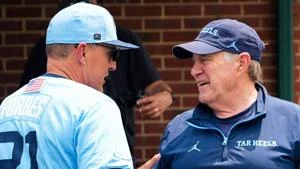On public college campuses in North Carolina, how much the head coach of an athletics team is paid is subject to open records laws.
For players in the new era of pay for play, those contracts will be exempt. Even with taxpayers helping fund them.
No members of the General Assembly disagreed last month, and Democratic Gov. Josh Stein affixed his signature July 2.
That was the day after enactment of a $2.8 billion antitrust settlement authorized last month by a federal judge for NCAA athletes. Known as the House settlement for former Arizona State swimmer Grant House, it allows each NCAA school – there are 350 in Division I, and 1,100 in all three divisions – to pay athletes for use of their name, image and likeness.
The acronym is NIL, and it impacts 200,000 athletes on the Division I level, and about 500,000 throughout the NCAA.
Various Ed Law/Tax Acct/NIL Changes, as House Bill 378 was called, has a number of changes for funds held in education savings and investment accounts. It also exempts “name, image, and likeness contracts from public records requirements.”
So, whereas the contract Carolina signed with eight-time Super Bowl champion coach Bill Belichick is public record, it is unknown how much money was in a pact luring Purdue quarterback Ryan Browne to transfer to Chapel Hill. Given he transferred back to the Big 10 school after spring practice, details of payments tied to availability for scheduled games or for merely being on campus for spring ball are also left for wonder.
Then, too, perhaps it helped Gio Lopez decide after South Alabama’s spring practice to come to Carolina. He went into the transfer portal two days after the Jaguars wrapped up.
Schools in this first year of the settlement can share up to about $20.5 million with the athletes. Regardless of whether it sounds like a lot, football and men’s basketball are likely to get the biggest shares. Theirs are the greater revenue deals for broadcasts.
Consider, the student-newspaper at Duke – private institutions are not bound by the same public records statutes – reported basketball freshman Cooper Flagg was raking in $28 million through a deal inclusive of New Balance, Fanatics and Gatorade among others. He was the No. 1 pick in the NBA Draft three weeks ago, signing a deal with the Dallas Mavericks for $13.8 million his first year that does not include endorsements.
Nine football players are believed to have deals exceeding $3 million for this season, led by Texas quarterback Arch Manning’s reported $6.6 million.
Players have been getting paid since 2021. The rule change then allowed what are called third party, donor-backed collectives; those are still around and used, and the House settlement allows schools to pay directly.
While the House settlement was ballyhooed and expected, in an age of litigation it’s not a safe bet to spread calm across the ocean depths of college athletics. For example, this week, “valid business purpose” has entered the litigation chat via a letter from the new College Sports Commission to athletics directors.
Passage of North Carolina’s law was 42-0 in the Senate and 111-0 in the House of Representatives. In fact, at no point was there a single vote in either chamber against the bill authored by Rep. Ray Pickett, R-Watauga.
And in case that Belichick contract was missed when signed in January, it’s five years in length, each with a $1 million base and $9 million in supplemental. Three years are guaranteed for the 73-year-old who was defensive coordinator for two Super Bowl wins with the New York Giants and head coach for six of them with the New England Patriots.
Not really that close to Flagg.






